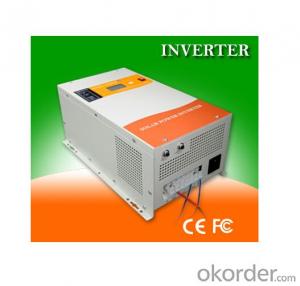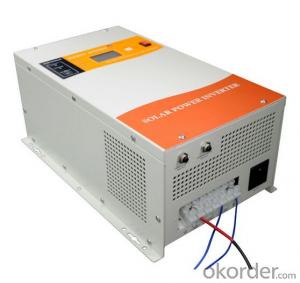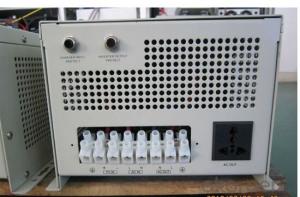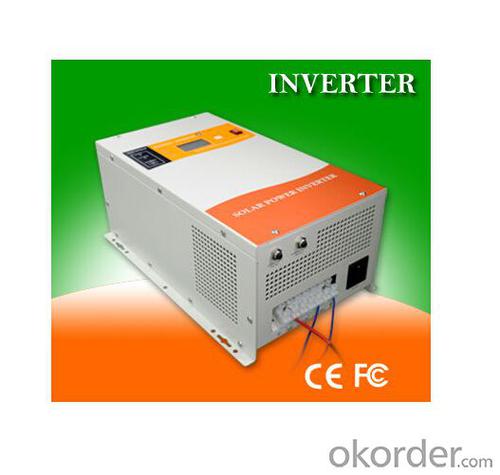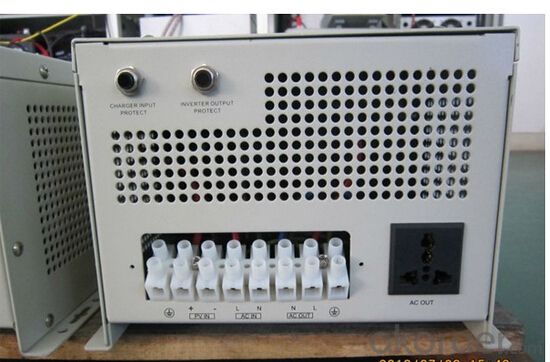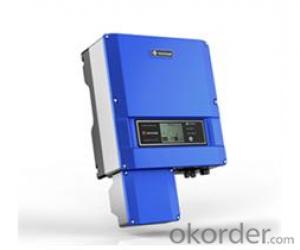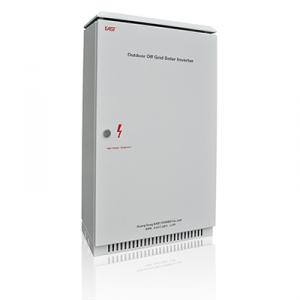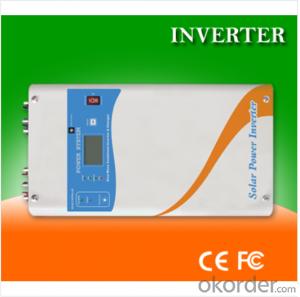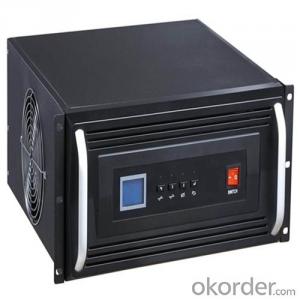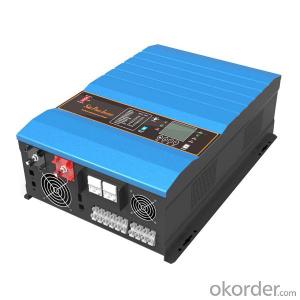30 Amp Solar Inverter 1000w 2000w 3000w Pure Sine Wave Inverter with MPPT Controller
- Loading Port:
- China main port
- Payment Terms:
- TT OR LC
- Min Order Qty:
- 10 pc
- Supply Capability:
- 10000 pc/month
OKorder Service Pledge
OKorder Financial Service
You Might Also Like
1.Specifications
1. Copper transformer
2. solar inverter
3. With Mppt charge controller
4. Pure sine wave
5. Sample available
1000w 2000w 3000w pure sine wave inverter with MPPT controller
2. Features
1.Pure sine-wave out put,can be used with different domestic appliance TV,Refrigerator,Fan,Air conditioner ,Induction cooker,micro-wave oven etc.
2. Generator compatibly and external battery connection achievable.
3. Generator compatible
Hybrid Inverter | ||
MPPT solar controller function | ||
Rated Voltage | 12/24V DC | |
Rated Charge current | 40A | |
Load current | 15A | |
Input voltage range | 15-55V DC | |
Max. PV open circuit array voltage | 55V DC | |
Typical idle consumption | At idle< 10mA | |
Overload protection(DC load) | 2.0*Inom>5s 1.5*Inom>20s 1.25*Inom temperature controlled | |
Bulk charge | 14.6V(default) | 29.2V(default) |
Floating charge | 13.4V(default) | 26.8V(default) |
Equalization charge | 14.0V(default) | 28.0V(default) |
Over charge disconnection | 14.8V | 29.6V |
Over charge recovery | 13.6V | 27.2V |
Over discharge disconnection | 10.8V(default) | 21.6V(default) |
Over discharge reconnection | 12.3V | 24.6V |
Temperature compensation | 13.2mV/C | 26.4mV/C |
Lead acid battery settings | Adjustable | |
NiCad battery settings | Adjustable | |
Load control mode | 1.Low Voltage Reconnect(LVR):Adjustable 2.Low Voltage Disconnect(LVD):Automatic disconnection 3.Reconnection:Includes warning flash before disconnect and reconnection | |
Low voltage reconnect | 12.0-14.0Vdc | 24.0-28.0Vdc |
low voltage disconnet | 10.5-12.5Vdc | 21.0-25.0Vdc |
Ambient temperature | 0-40°C(full load) 40-60°C(de-rating) | |
Altitude | Operating5000m,Non-Operating 16000m | |
Protection class | IP21 | |
Battery temperature sensor | BTS-optional remote battery temperature sensor for increased charging precision | |
Terminal size(fine/single wire) | #8 AWG | |
PV inverter battery priority | |||||||
MODEL | 1000w | 1500w | 2000w | 3000w | |||
Input Voltage Waveform | Sinusoidal (utility or generator) | ||||||
Nominal Input Voltage | 230Vac | ||||||
Low Line Disconnect | 155Vac±4% | ||||||
High Line Disconnect | 265Vac±4% | ||||||
Max AC Input Voltage | 270Vrms | ||||||
Nominal Input Frequency | 50Hz/ 60Hz (Auto detection) | ||||||
Over-Load Protection | Circuit breaker | ||||||
Output Short Circuit Protection | Circuit breaker | ||||||
Efficiency (Line Mode) | >95% | ||||||
Transfer Switch Rating | 30A | ||||||
Transfer Time(Ac to Dc) | 20ms (typical) | ||||||
Output Voltage Waveform | Sine wave | ||||||
Rated Output Power (W) | 1000W | 1500W | 1500W | 2000W | 2000W | 3000W | 3000W |
Power Factor | 1 | ||||||
Nominal Output Voltage (V) | 230Vac | ||||||
Output Voltage Regulation | ±10% rms | ||||||
Nominal Efficiency | >80% | ||||||
Nominal DC Input Voltage | 12V | 12V | 24V | 12V | 24V | 12V | 24V |
Nominal Charge Current | 35A | 45A | 35A | 65A | 35A | 75A | 45A |
Charge Current Regulation | ± 5A | ||||||
Battery initial voltage | 0 –15.7 Vdc /31.4Vdc(can operate with 0V battery) | ||||||
Communication: | RJ11 (Used for factory testing. No customer interface available) | ||||||
Safety Certification | CE(EN60950) | ||||||
EMI Classification | EN50091-2, CLASS A | ||||||
Operating Temperature Range | 0°C to 40°C | ||||||
Storage temperature | -15ºC ~ 60ºC | ||||||
Operation humidity | 5% to 95% | ||||||
Audible Noise | 60dB max | ||||||
Cooling | Forced air, variable speed fan | ||||||
3.FAQ
Q1: How to choose a right inverter?
A1:Tell us your demand, then our sales will recommend a suitable inverter to you.
Q2: What's the different between inverter and solar inverter?
A2: Inverter is only accept AC input, but solar inverter not only accept AC input but also can connect with solar panel to accept PV input, it more save power.
Q3: How about the delivery time?
A3: 7 days for sample; 25 days for bulk order.
Q4: What is the warranty of inverter?
A4: One year warranty on Must-Solar product.
Q5: How to solve the technical problem?
A5: 24 hours after-service consultancy just for you and to make your problem to solve easily.
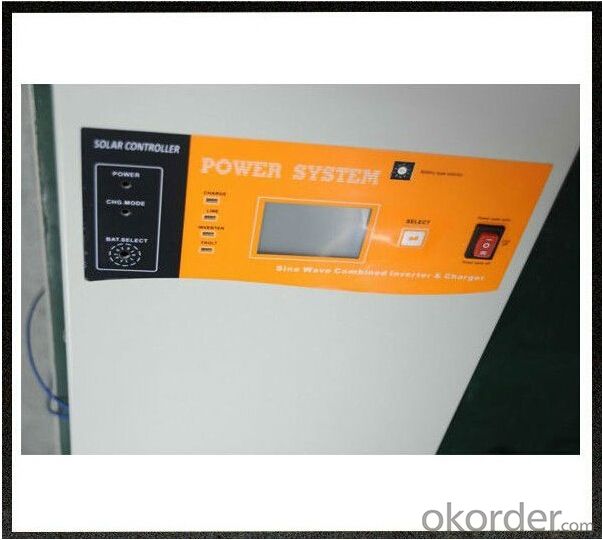
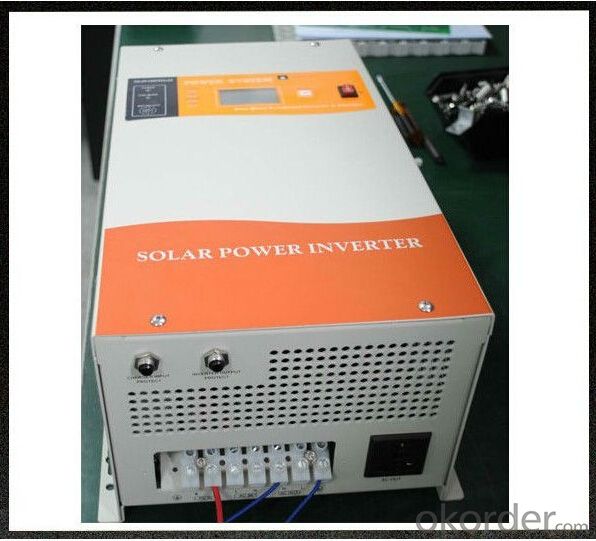
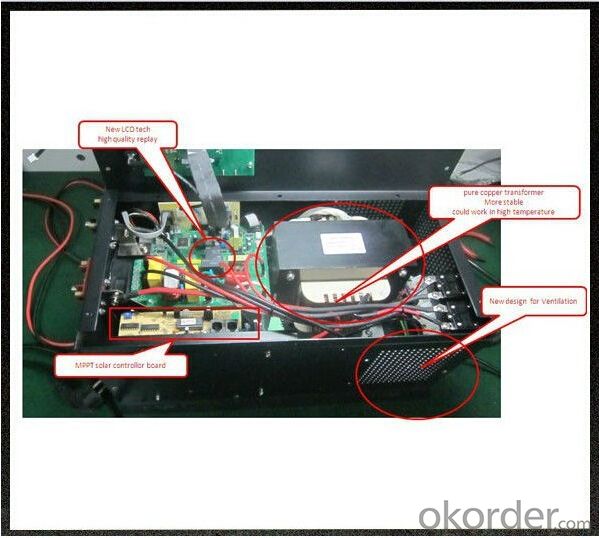
- Q: Can a solar inverter convert DC power to AC power during a power outage?
- No, a solar inverter cannot convert DC power to AC power during a power outage. Solar inverters rely on the grid for synchronization and voltage reference, so when there is a power outage, the inverter automatically shuts down to prevent back-feeding electricity into the grid and endangering utility workers.
- Q: What is the maximum power capacity that a solar inverter can handle?
- The maximum power capacity that a solar inverter can handle varies depending on the specific model and brand. However, modern solar inverters can typically handle power capacities ranging from a few hundred watts to several megawatts.
- Q: What is the role of a solar inverter in voltage and frequency regulation during grid disturbances?
- Maintaining the stability and reliability of the electrical grid heavily depends on the crucial role of a solar inverter in voltage and frequency regulation during grid disturbances. To regulate and stabilize the electrical parameters, the solar inverter acts as a control device during grid disturbances like voltage fluctuations or frequency deviations. Regarding voltage regulation, the solar inverter constantly monitors the grid's voltage level and adjusts its output accordingly. It decreases its output if the grid voltage increases to avoid overvoltage conditions. Conversely, if the grid voltage decreases, the inverter increases its output to compensate and maintain a stable voltage level. This regulation guarantees that the solar inverter's voltage aligns with the grid's requirements, preventing harm to electrical equipment and ensuring the grid's safe operation. Similarly, the solar inverter also contributes to frequency regulation during grid disturbances. It continuously monitors the grid's frequency and adjusts its output frequency to match it. If the grid frequency deviates from the standard frequency, the inverter modifies its output frequency to bring it back to the desired level. This frequency regulation is vital to keep various electrical devices connected to the grid synchronized, preventing equipment damage, and ensuring the grid's stability. In summary, the solar inverter's role in voltage and frequency regulation during grid disturbances is to provide stability and reliability to the electrical grid. It acts as a control device that constantly monitors and adjusts its output to maintain the desired voltage and frequency levels. This ensures the prevention of potential damage to electrical equipment and guarantees the smooth operation of the grid.
- Q: Can a solar inverter be used in systems with different module strings?
- Yes, a solar inverter can be used in systems with different module strings. Solar inverters are designed to convert the direct current (DC) generated by solar panels into alternating current (AC) that can be used to power homes or businesses. They are typically compatible with a wide range of module string configurations, allowing for flexibility in system design and installation. However, it is important to ensure that the solar inverter's power rating and specifications are suitable for the combined power output of the module strings to ensure optimal performance.
- Q: Can a solar inverter be used with different types of mounting systems?
- Yes, a solar inverter can be used with different types of mounting systems. The inverter is responsible for converting the direct current (DC) produced by solar panels into alternating current (AC) that can be used to power household appliances. The mounting system is independent of the inverter and is designed to securely hold the solar panels in place. As long as the inverter is compatible with the electrical specifications of the solar panels, it can be used with various types of mounting systems such as rooftop, ground-mounted, or tracking systems.
- Q: What is the maximum number of solar panels that can be connected to a single inverter?
- The maximum number of solar panels that can be connected to a single inverter depends on the specifications and capacity of the inverter. However, there is no fixed number as it varies depending on factors such as the size and wattage of the panels, the voltage and capacity of the inverter, and the overall system design. It is recommended to consult the manufacturer's guidelines or a professional installer to determine the maximum number of panels that can be connected to a specific inverter.
- Q: What is the role of a voltage regulation feature in a solar inverter?
- The role of a voltage regulation feature in a solar inverter is to ensure that the voltage output from the solar panels is maintained at a stable and optimal level. This helps to protect the sensitive electrical components in the solar inverter and other connected devices, while also maximizing the efficiency and performance of the solar power system.
- Q: What is a solar inverter?
- A solar inverter is an essential component of a solar power system that converts the direct current (DC) generated by solar panels into alternating current (AC) electricity suitable for use in households and businesses. It ensures optimal performance and connectivity between the solar panels and the electrical grid, allowing for efficient utilization of solar energy.
- Q: What are the key factors affecting the compatibility of a solar inverter with other system components?
- The key factors affecting the compatibility of a solar inverter with other system components include the voltage and frequency requirements, the type of PV modules used, the communication protocols supported, the maximum power output capacity, the efficiency and reliability of the inverter, and the overall system design and configuration.
- Q: Can a solar inverter be used in systems with different module currents?
- Yes, a solar inverter can be used in systems with different module currents. Solar inverters are designed to convert the DC power produced by the solar panels into AC power for use in the electrical grid or for powering appliances. They typically have a wide range of input voltage and current ratings to accommodate different solar panel configurations. As long as the total power output of the solar panels is within the specifications of the inverter, it can be used in systems with varying module currents.
Send your message to us
30 Amp Solar Inverter 1000w 2000w 3000w Pure Sine Wave Inverter with MPPT Controller
- Loading Port:
- China main port
- Payment Terms:
- TT OR LC
- Min Order Qty:
- 10 pc
- Supply Capability:
- 10000 pc/month
OKorder Service Pledge
OKorder Financial Service
Similar products
Hot products
Hot Searches
Related keywords
